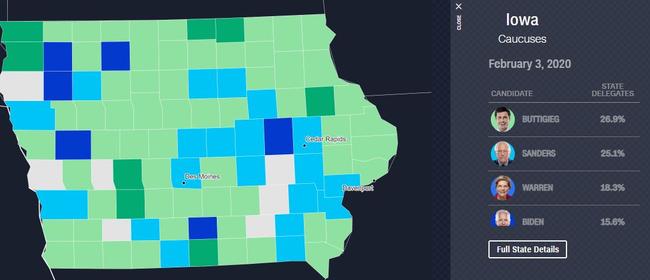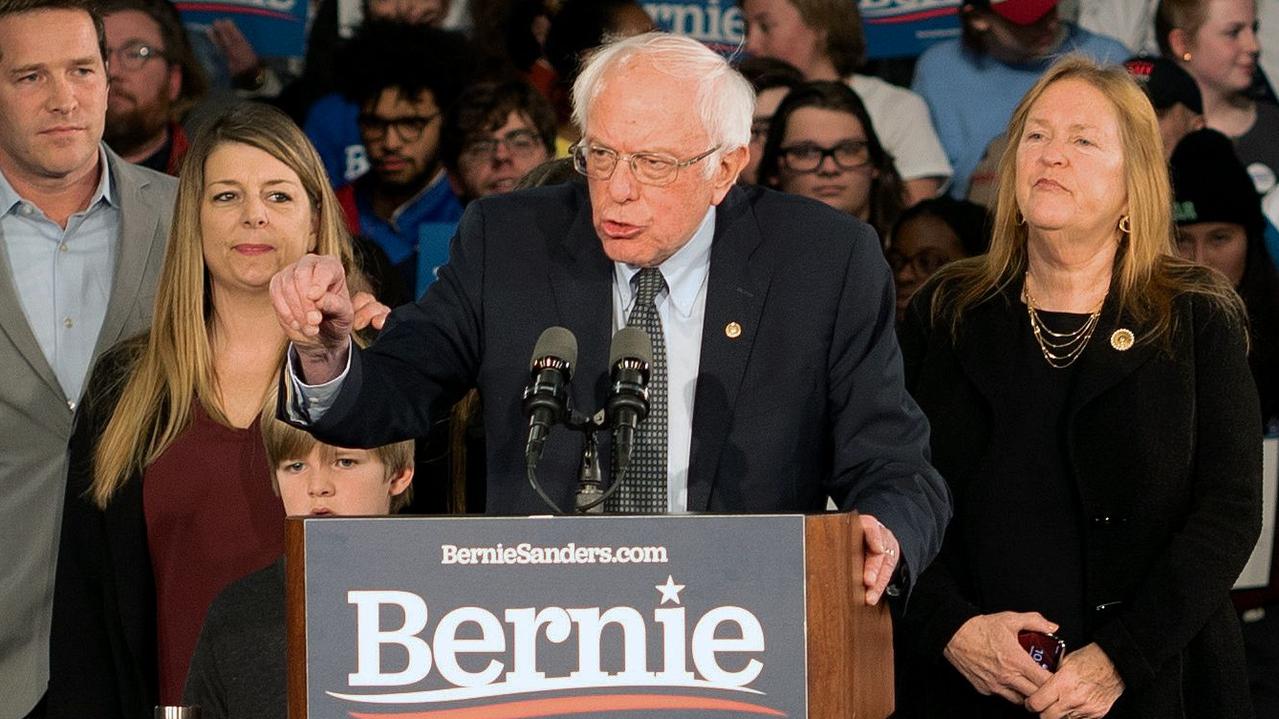Iowa caucuses: Multiple shocks in first results of the US election campaign
A day after badly bungling the first official vote of the 2020 presidential election, America’s Democratic Party has finally revealed results.

America’s Democratic Party is still reeling from its disastrous handling of the Iowa caucuses yesterday, which caused huge delays in the reporting of results and left the first contest of the 2020 presidential race without a declared winner.
Today, a full day after the numbers were supposed to start rolling in, the party was ready to announce partial results - albeit from only 62 per cent of the state’s precincts.
Speaking before those results were revealed, chairman of the Iowa Democratic Party Troy Price described the delay as “unacceptable”.
“As chair of the party, I apologise deeply for this,” Mr Price told reporters.
“We were faced with multiple reporting challenges, and decided out of an abundance of caution to protect the integrity of the Iowa caucuses by taking the necessary steps to thoroughly review the results.
“We know this data is accurate. We also have a paper trail, documentation that we’ve been able to use to provide information to help verify the results.”
Mr Price repeatedly said the party would take “the time we need” to complete the vote count. He did not give an estimate for when the remaining third of precincts would report results.
The party chairman blamed a “coding error” in an app the Democrats were using to record the results for causing the delay.
RELATED: How yesterday’s ‘unbelievable’ drama unfolded
MULTIPLE SHOCKS IN IOWA RESULTS
Despite this morning’s confusion, reports are now rolling in from the chaotic Iowa Democratic Party caucuses.
Former mayor Pete Buttigieg is holding a narrow lead over Bernie Sanders in long-delayed results, and former vice-president Joe Biden is trailing badly in fourth place with about 71 per cent of precincts reporting.
US senator Elizabeth Warren is third in the results released a day after Iowans poured into more than 1600 public locations to begin the five-month process of picking a challenger to Republican President Donald Trump for November’s election.
Buttigieg, had 26.8 per cent of state delegate equivalents, the data traditionally reported to determine the winner.
Sanders, a US senator, had 25.2 per cent, while his fellow progressive, Warren, was at 18.4 per cent and Biden at 15.5 per cent. Senator Amy Klobuchar was fifth at 12.6 per cent.
The first surprise is the success of Mr Buttigieg, who is the youngest and least experienced candidate in the race.
Mr Buttigieg, 38, is the former mayor of South Bend, a mid-sized American city. He has never held any office at national level, and few voters even knew who he was when he announced his candidacy.
He is also the first openly gay presidential candidate in history.
The other shock is the poor performance of Mr Biden, who served as Barack Obama’s vice president and has been the frontrunner in national polls for months.

Now, because the Iowa caucuses are ridiculously convoluted, there are actually three different sets of numbers being reported. To put them in context, we need to explain how the process works. Buckle up.
It’s not like your usual election, where voters simply show up, cast a ballot and then go home. Instead they meet at caucus sites around the state and vote in at least two rounds. There are 1700 such sites.
In round one, the key threshold of support a candidate needs to meet is 15 per cent. Fall under that bar, and they are knocked out.
In round two, the people who voted for one of the knocked out candidates are given a chance to shift their vote to someone else.
The process continues until only viable candidates are left.
So, what are the three numbers being reported by the Democratic Party?
The first is the popular vote after the first round of voting, which you can write off as completely irrelevant.
Next is the popular vote after the final round of voting.
And last is the percentage of state delegates earned, which is the measure used to determine who officially wins the state.
Mr Buttigieg is leading the race for state delegates, which means he is technically winning Iowa with 62 per cent of precincts reporting.
But at the same time, Mr Sanders is narrowly leading the popular vote after the final round, with 28,220 votes to Mr Buttigieg’s 27,030.
Think of it as a similar system to America’s electoral college, which rewards presidential candidates for winning a large number of states instead of running up the popular vote in a handful of them. That is how Donald Trump beat Hillary Clinton in 2016, despite losing the popular vote.
In this case, Mr Sanders is running up the score in some parts of Iowa where he is particularly strong, but Mr Buttigieg is being rewarded for having broader support across all areas of the state.
Confusing, right?
The upshot, if the numbers stay this way, is that both candidates can and will claim a moral victory of sorts.

WHY IOWA MATTERS SO MUCH
The caucuses, convoluted as they are, represent the first chance for Democratic voters to have their say on who they want to represent them as their party’s nominee against Donald Trump in November.
America’s other 49 states will hold their own caucuses and primaries in the coming months. At the end of that process, one candidate will claim the Democratic presidential nomination and move on to contest the general election.
Iowa’s results usually set the tone for the rest of the primaries, giving some candidates fresh momentum and knocking others out of the race entirely.
This time, however, nothing went as planned.
Technical problems and worries over “inconsistencies” in the vote count stopped the Iowa Democratic Party from reporting results – any results at all – last night. As evening turned to late night, early morning and eventually the next day, the official count remained at zero.
A lack of communication from party officials yesterday helped feed the growing sense of chaos, as news networks openly wondered why no results had been announced hours after voting had finished.
Two phone calls between officials and the candidates’ staff, which were supposed to update them on the situation, were reportedly very short, with party representatives hanging up before they could be asked questions.
Eventually, an explanation did emerge.
The party had wanted precinct captains – the people responsible for each individual caucus – to report their results using an app, developed by a company called Shadow.
But multiple precinct captains had trouble downloading and logging in to the app, meaning they had to call in their results by phone instead.
That led to long wait times. One precinct captain, Shawn Sebastian, called CNN to say he had been on hold with the party for an hour. While he was explaining his predicament on air, he was taken off hold – and amid the cross-talk, the party hung up on him.
Today Shadow apologised for the debacle involving its app.
We sincerely regret the delay in the reporting of the results of last night’s Iowa caucuses and the uncertainty it has caused to the candidates, their campaigns, and Democratic caucus-goers.
— Shadow, Inc. (@ShadowIncHQ) February 4, 2020
As the Iowa Democratic Party has confirmed, the underlying data and collection process via Shadow’s mobile caucus app was sound and accurate, but our process to transmit that caucus results data generated via the app to the IDP was not.
— Shadow, Inc. (@ShadowIncHQ) February 4, 2020
In a statement released last night, the party also revealed it had found “inconsistencies” in the reporting of results and needed to take extra time to validate them.
“In addition to the tech systems being used to tabulate results, we are also using photos of results and a paper trail to validate that all results and to ensure that we have confidence and accuracy in what we report,” it said.
“This is simply a reporting issue.
“The underlying paper and data trail is sound and will simply take time to further report the results.”
The long delay meant none of the five leading candidates could be declared the victor before flying off to New Hampshire, which holds its primary next week.
That didn’t stop a couple of them from all but claiming victory anyway.
“So we don’t know all the results. But, we know, by the time it’s all said and done, Iowa you have shocked the nation,” Mr Buttigieg told his supporters yesterday.
“Because, by all indications, we are going on to New Hampshire victorious.”
“I have a strong feeling that at some point, the results will be announced. And when those results are announced, I have a good feeling we are going to be doing very, very well here in Iowa,” Mr Sanders told his own crowd.


Anectodal evidence from caucus sites suggested Mr Sanders and Mr Buttigieg had performed well. Both of their campaigns released internal data backing that up.
But absent official results, there was no way to verify either campaign’s claims, and of course neither was an impartial source of information.
Buttigieg campaign official sharing some details of the internal counts they have so far pic.twitter.com/SL1MaGz93F
— Henry J. Gomez (@HenryJGomez) February 4, 2020
The @BernieSanders campaign just released 40% of precinct results via their captains; shows Sanders winning in every first count, final count, and delegate tally. pic.twitter.com/tHS1Dusxmt
— Cara Korte (@CaraKorte) February 4, 2020
The Democratic Party’s bungled process has been derided as a “train wreck” by Donald Trump’s re-election campaign, a “total mess” by one former Democratic candidate and “unbelievable” by one of the party’s current contenders, Ms Klobuchar.
“Democrats are stewing in a caucus mess of their own creation with the sloppiest train wreck in history. It would be natural for people to doubt the fairness of the process. And these are the people who want to run our entire health care system?” said Mr Trump’s campaign manager Brad Parscale.
“President Trump posted a record performance in the well run Republican Iowa caucuses with record turnout for an incumbent.”




